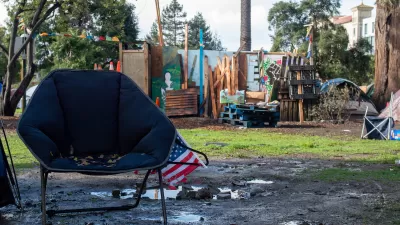Critics of a new provision calling “social noise” an environmental impact say the law can too easily be co-opted by anti-housing groups to block new development.

An opinion piece from early March by Jennifer Hernandez and Robert Apodaca in the Los Angeles Times outlines how community groups have used the California Environmental Quality Act (CEQA) to block new student housing at the University of California, Berkeley.
The authors argue that building more housing close to campus is in fact the more environmentally friendly option. “More students living near campus means less traffic.” But a recent court ruling halted plans for a new housing complex and forced the university to withhold admission from thousands of potential new students, citing the potential impacts of a higher population.
Now, a new court ruling deems noise from college parties an environmental impact, giving NIMBY groups another weapon in their fight against new university housing. The authors see this as a slippery slope to other restrictions. “The concept of ‘social noise’ is perfectly designed to block housing in existing neighborhoods. If this ruling stands, other demographic and individual behaviors could become adverse ‘environmental’ impacts under CEQA.” Meanwhile, the authors point out that students who experience housing insecurity are more likely to drop out, making affordable housing a crucial part of supporting student success.
More on the UC Berkeley story:
FULL STORY: Opinion: How California came to treat UC Berkeley students’ ‘noise’ as a dire environmental threat

Planetizen Federal Action Tracker
A weekly monitor of how Trump’s orders and actions are impacting planners and planning in America.

San Francisco's School District Spent $105M To Build Affordable Housing for Teachers — And That's Just the Beginning
SFUSD joins a growing list of school districts using their land holdings to address housing affordability challenges faced by their own employees.

The Tiny, Adorable $7,000 Car Turning Japan Onto EVs
The single seat Mibot charges from a regular plug as quickly as an iPad, and is about half the price of an average EV.

Seattle's Plan for Adopting Driverless Cars
Equity, safety, accessibility and affordability are front of mind as the city prepares for robotaxis and other autonomous vehicles.

As Trump Phases Out FEMA, Is It Time to Flee the Floodplains?
With less federal funding available for disaster relief efforts, the need to relocate at-risk communities is more urgent than ever.

With Protected Lanes, 460% More People Commute by Bike
For those needing more ammo, more data proving what we already knew is here.
Urban Design for Planners 1: Software Tools
This six-course series explores essential urban design concepts using open source software and equips planners with the tools they need to participate fully in the urban design process.
Planning for Universal Design
Learn the tools for implementing Universal Design in planning regulations.
Smith Gee Studio
City of Charlotte
City of Camden Redevelopment Agency
City of Astoria
Transportation Research & Education Center (TREC) at Portland State University
US High Speed Rail Association
City of Camden Redevelopment Agency
Municipality of Princeton (NJ)





























